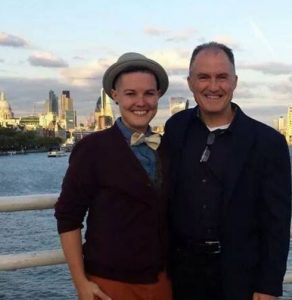Podcast: Play in new window | Download
This belongs to the general series on the incredible power of partnership — of “paired leadership.” And this is the last for now in the mini-series on “leading a subordinate to partnership.” The first 4 are all available at danmulhern.com/category/reading-for-leading.

I have been writing about helping lead a subordinate to become a partner. And last week admitted that the subordinate — my daughter Kate — led me. But it occurred to me (duh) that if this is truly a partnership — paired leadership — then I needed to get and share Kate’s perspective. I interviewed her, and share her words below. I believe they make complete sense if heard from the standpoint of how a subordinate — you or yours? — may well feel. Of course, if you are an active parent (hopefully we never stop being active!), hear her wisdom, and share yours — and perhaps your children’s wisdom with me and other readers.
I read Kate this main question and her verbatim answer is below:
Dan: I have written about how I believe – with the clarity of 20/20 hindsight — that the strongest part of my mind – the part that controlled my words and especially my tone of voice and facial expressions — saw you as a rebel and in many ways tried to suppress your rebellion. Is this what you felt? What did it feel like on the other side of that?
Kate: [verbatim and unedited, other than the bullet points I’ve inserted:
- “I never felt like a rebel. Never felt like I was rebelling against you. I know that that would be what a parenting book would characterize my behavior as. I was very aware of that. I was feeling like I was ‘the difficult one.’ But I wouldn’t’ characterize it as rebellion. I might have called it questioning – more than anything. That questioning — it always started from a place of questioning — and it would turn into a fight a lot of times because maybe I wasn’t feeling seen, heard, or listened to.
- “What I didn’t understand was what I didn’t understand; as a kid I only had the perspective I had. There was only so much I could have known.
- “You would push me to see things from your perspective and a lot of what I didn’t know was from your perspective.
- “My experience of you pushing me to see from your perspective, felt like I was supposed to change. My perspective was wrong. Not different. But wrong.
- “‘Rebellion’ is a tough word because the implicit meaning is you [the rebel] are trying to overturn some power. That was never what I was fighting for — to overturn some power. In the same sense that protesters want to get people to see what’s right or just, I was trying to get my voice heard to change what I didn’t see as right. It wasn’t so much personal towards you.”
For those of you who are long past being a child, adolescent, or young adult, can you remember how Kate felt??? Hasn’t she captured the gap of understanding so well?! Those of you who are supervisors, managers, directors, executives, can you see how they can’t automatically see your perspective (after all, they’re not in your meetings, your experience, your mind, etc.)? And can you see — as I so frequently did not — that they are just trying to get it — as Kate said — right. Not trying to overthrow you?
Let me share one more part of the conversation. It’s brief, and though the telling is brief it was a long, long-time coming.
Dan: Do you feel like a partner now?
Kate: Yeah.
Dan: Why? What makes you feel like a partner?
Kate: You respect me more. You appreciate what I bring to the table. You want to bounce ideas off of me and hear what I have to say about things. And that makes me feel valued.
Kate points the way to every relationship that can be one of partnership, of paired leadership, to
Lead with your best self,
Dan
